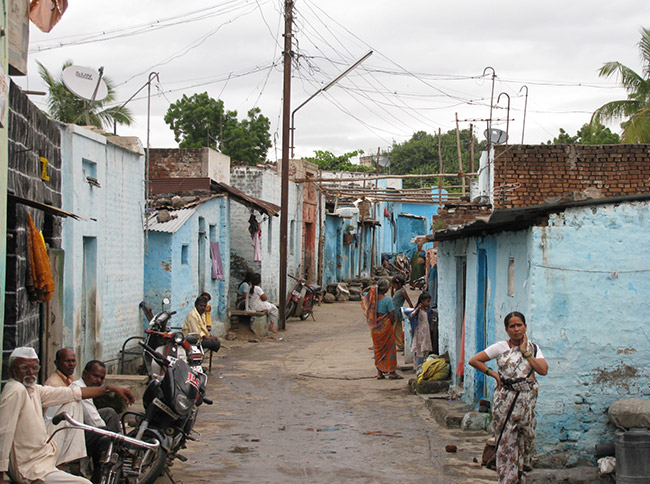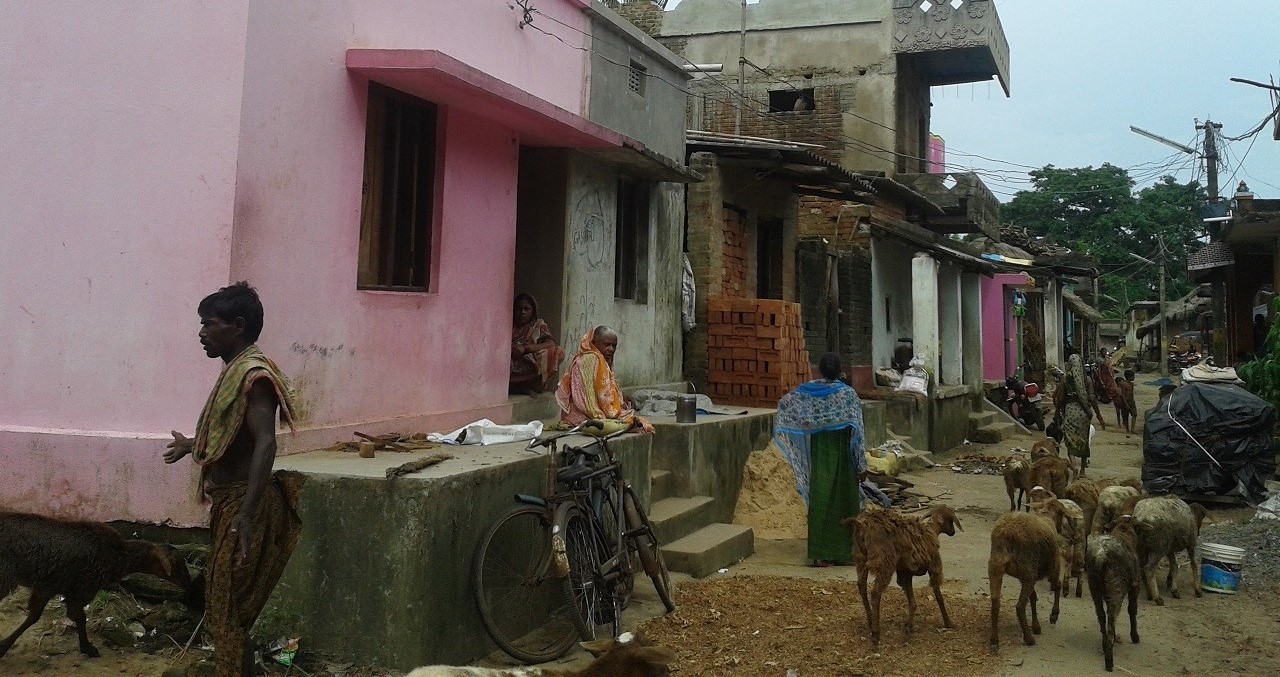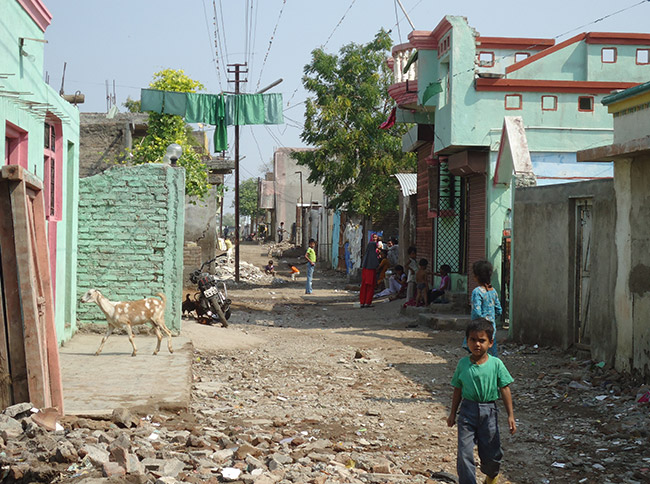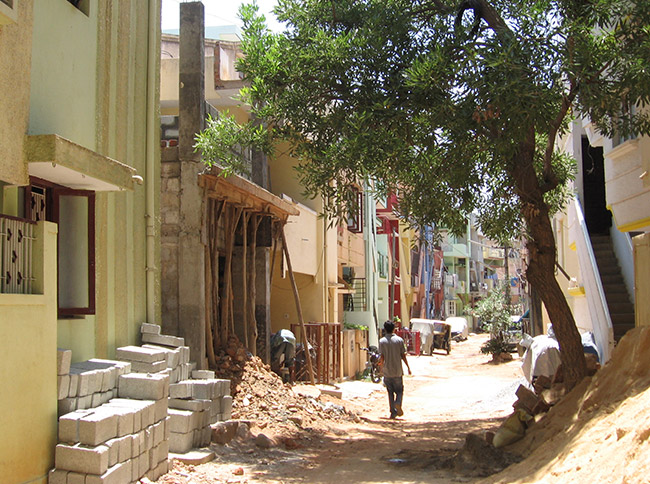
UIRF I: Laying the Foundations Project
Urban India Research Facility (UIRF)
Funded By: The Ford Foundation.
Two projects were undertaken and completed between 2009-11 and 2011-13.
UIRF is a Facility for interdisciplinary research on contemporary issues in small and medium towns in India. It brings together theory, practice and advocacy while promoting values of dignity, equity and justice.
UIRF I: Laying the Foundations Project (2009-11)
The Laying The Foundations Project was initiated by UIRF to enhance the influence of citizens on urban reforms by providing relevant knowledge support and services to local academic institutions and civil society organisations in small and medium towns. Studies were done at three scales: national, regional (state level) and local (town level). The project adopted an unconventional methodology that sought to integrate participation at every level. These studies resulted in a series of interlinked knowledge products that cumulatively prepared city-level activists and institutions to gain insight into and engage with ongoing processes of reforms.
As part of the two-year-long study, several town and state-level workshops, seminars and conferences were held in order to engage the various stakeholders including locals, political representatives, bureaucrats, and people’s representatives. The focus of these engagements was to obtain a critical overview of institutions, procedures, processes and their inter-linkages at the national, state and local body level.
NATIONAL
The National Level Background Paper critically examines trends and factors that affect urbanisation in India and provides an insight into the evolution of policies, institutions and issues linked to various urban sectors.
National level Background Document on Urban Issues and Concerns By Geetanjoy Sahu, Yacoub Zachariah and Sandipan Baksi School of Habitat Studies, TISS, Mumbai
REGIONAL
State level trajectories of urban development are highly distinct and have implications for issues at the ground level. Hence, four state level background papers were prepared for the states of Maharashtra, Odisha, Rajasthan and Tamil Nadu. These background papers take a sectoral approach and give an overview of urbanisation issues and institutional dynamics in the respective states.
State-level Background Papers:
1. Maharashtra
By Amita Bhide and Smita Waingankar
School of Habitat Studies, TISS, Mumbai
2. Madhya Pradesh
By Jacob Thudipara, Shyamly Sharma, Deepesh Choukse
Indore School of Social Work, Indore
3. Rajasthan
By KN Joshi
Institute of Development Studies, Jaipur
4. Odisha
By Unmesh Patnaik, Soumya Mishra and Kalika Mohapatra
KIIT School of Rural Management, KIIT University, Bhubaneswar
5. Tamil Nadu
By M.Vijayabaskar, Karen Coelho, Sriharini Narayanan and T. Venkat
The Madras Institute of Development Studies (MIDS), Chennai
State-level Status Report on Urban Reforms
The objective of these reports was to not merely document the status of urban reforms but also the process of implementation and their implications, particularly on urban poor groups.
1. Maharashtra
By Sanjeev Chandorkar, Devang Pandya, Yacoub Zachariah,
School of Habitat Studies, TISS
2. Madhya Pradesh
By Jacob Thudipara, Shyamly Sharma, Deepesh Choukse, Sandeep Ganvir
(City Collaborator, Ujjain) and Anand Lakhan (City Collaborator Indore)
Indore School of Social Work, Indore
3. Rajasthan
By KN Joshi
Institute of Development Studies, Jaipur
4. Odisha
By Unmesh Patnaik, Soumya Mishra and Kalika Mohapatra
KIIT School of Rural Management, KIIT University, Bhubaneswar
5. Tamil Nadu
By Madras Institute of Development Studies (MIDS) with contributions from
the Center for Development Finance (CDF) of the Institute for Financial and
Management Research (IFMR), Chennai
The project adopted a consultative approach to research and preparation of the knowledge products. It began with a consultative meeting that involved experts from varied fields to solicit their feedback on the overall study and its approach. Workshops were also organised with state level and town level partners. In addition, workshops were held in the various towns to both introduce the study as well as to present it before a wider audience.
JNNURM reforms – A Brief Introduction
The document provides a brief introduction of each reform and the rationale behind it as envisaged by JNNURM, along with concerns of the common citizens. It covers all twenty-three reforms applicable to all urban centres across India, hence its utility and scope goes beyond the state of Maharashtra.
JNNURM: Nagarikankarita Margdarshika, Maharashtratil Garibansathichya Nagari Sudharananchi Sthiti (JNNURM : Citizens Guide – Status of Pro-Poor reforms in Maharashtra)
This citizen guide assesses the state of poverty within Maharashtra and focuses specifically on pro-poor reforms as proposed within the JNNURM.
LOCAL
The town-level reports focus on local governments such as municipal councils, which play a key role in the urbanisation of the area. The reports provide analysis of policy-level factors, which assume special significance for the development of the towns. Some also take into account the status of reforms and projects executed through schemes such as the JNNURM, which have influenced current and future development in the town.
MAHARASHTRA
Town-level Background Papers:
1. Akola
By Ravindra Jadhav, Tejas Pol, Seema Kakde, and Pranjal Deekshit
Resources and Livelihoods Group, PRAYAS, Pune
2. Chandrapur
By Ravindra Jadhav, Tejas Pol, Seema Kakde, and Pranjal Deekshit
Resources and Livelihoods Group, PRAYAS, Pune
3. Chiplun
By Ravindra Jadhav, Tejas Pol, Seema Kakde, and Pranjal Deekshit
Resources and Livelihoods Group, PRAYAS, Pune
4. Jalna
By Ravindra Jadhav, Tejas Pol, Seema Kakde, and Pranjal Deekshit
Resources and Livelihoods Group, PRAYAS, Pune
5. Parbhani
By Ravindra Jadhav, Tejas Pol, Seema Kakde, and Pranjal Deekshit
Resources and Livelihoods Group, PRAYAS, Pune
Report for Dialogue on Solutions to Local Problems in Municipal Solid Waste Management:
1. Satara
By Ravindra Jadhav, Tejas Pol, Seema Kakde, and Pranjal Deekshit
Resources and Livelihoods Group, PRAYAS, Pune
2. Chiplun
By Ravindra Jadhav, Tejas Pol, Seema Kakde, and Pranjal Deekshit
Resources and Livelihoods Group, PRAYAS, Pune
3. Junnar
By Ravindra Jadhav, Tejas Pol, Seema Kakde, and Pranjal Deekshit
Resources and Livelihoods Group, PRAYAS, Pune
4. Jalna
By Ravindra Jadhav, Tejas Pol, Seema Kakde, and Pranjal Deekshit
Resources and Livelihoods Group, PRAYAS, Pune
5. Akola
By Ravindra Jadhav, Tejas Pol, Seema Kakde, and Pranjal Deekshit
Resources and Livelihoods Group, PRAYAS, Pune
TAMIL NADU:
Town-level Background Papers:
1. Namakkal
By Madras Institute of Development Studies (MIDS) with contributions from
the Center for Development Finance (CDF) of the Institute for Financial and
Management Research (IFMR), Chennai
2. Kancheepuram
By Madras Institute of Development Studies (MIDS) with contributions from
the Center for Development Finance (CDF) of the Institute for Financial and
Management Research (IFMR), Chennai
3. Nagercoil
By Madras Institute of Development Studies (MIDS) with contributions from
the Center for Development Finance (CDF) of the Institute for Financial and
Management Research (IFMR), Chennai
ODISHA:
Town-level Background Papers:
1. Angul
By Unmesh Patnaik, Soumya Mishra and Kalika Mohapatra
KIIT School of Rural Management, KIIT University, Bhubaneswar
2. Berhampur
By Unmesh Patnaik, Soumya Mishra and Kalika Mohapatra
KIIT School of Rural Management, KIIT University, Bhubaneswar
3. Nayagarh
By Unmesh Patnaik, Soumya Mishra and Kalika Mohapatra
KIIT School of Rural Management, KIIT University, Bhubaneswar
THEMATIC OUTPUTS: The trinity of national-level papers, state-level papers and town-level papers generated a wealth of knowledge. Some of this was processed into three thematic research studies. One focussed on public-private partnerships and how reforms linked to them were being carried out. The second was linked to the knowledge needs of various urban actors at the small town level while the third was focused on an analysis of the content of reforms. All the thematic studies were focused on Maharashtra.
1. Report of the Scoping Study on Knowledge Related Needs, Urban Stakeholders in Small and Medium Towns in Maharashtra By Ravindra Jadhav, Tejas Pol, Seema Kakde, and Pranjal Deekshit Resources and Livelihoods Group, PRAYAS, Pune
The scoping study aimed at understanding the knowledge-related needs of different stakeholders in small and medium towns in Maharashtra. While it focused specifically on the present conditions and needs of urban local bodies, it also commented on the presence and perceptions of the civil society.
2. Status Report on Urban Reforms (For the State of Maharashtra) with Focus on Reform 'Encouraging Public-Private Partnerships' By Sanjeev Chandorkar and Devang Pandya, School of Habitat Studies, TISS
Based on interactions with several government and urban local body officials in Maharashtra, the Status Report provides an overview of the need, framework and challenges of the Public-Private Partnerships (PPP) model in general, and urban infrastructure in particular. Through the case studies of Aurangabad and Chandrapur, the report presents recommendations to look at the PPP model as a governance intervention and not just as a fiscal model.
3. Urban Water Security and Sustainability in India: A Case for Reforming the Reforms By Subodh Wagle, Pranjal Deekshit and Tejas Pol Resources and Livelihoods Group, PRAYAS, Pune
>This study looks at the existing infrastructure and service delivery provisions for urban water supply at different levels. Through an in-depth analysis of the adequacy, equity, environmental and systematic sustainability of the existing supply, it calls for institutional reform across different Indian states.
GUIDELINES, TOOLS AND RESOURCE KITS
Apart from producing several knowledge products, a parallel effort was made to evolve a set of guidelines and ‘tool kits’ that outlined the methodologies adopted and analytical tools used while preparing project reports. These kits were expected to serve a broad range of organisations from different locations, situated in diverse social, political, economic, institutional, and cultural settings.
Guidelines for Preparation of State Level Background Paper (SLBP)
The principal objective of the Guidelines for Preparation of SLBP is to map the relationships between ULBs and the state government in legal, financial, human resource dimensions and understand how these elements interface in practice to produce various systemic maladies or opportunities.
Tools and Resources Kit for Status Report on Urban reforms (SRUR)
SRUR is aimed at assessing status of progress of urban reforms and is expected to act as a knowledge base for undertaking advocacy activities to promote the public interest. The tool kit for SRUR is a set of guidelines for preparation of SRUR for a particular state.
Tools and Resources Kit for Report on Solutions to Local Problems (RSLP) and Town Level Background Note (TLBN)
This document is aimed at providing a template for making of the two town- level documents: RSLP and TLBN. Both the documents aim at enabling individuals or institutions to critique and engage in urban development.
Marathi Publications
Satara, Vikas Prashna Anek...Uttare ? (Satara, Multiple Development Questions.....Answers?): A Town level Status Report (Marathi)
Prepared by project partner PRAYAS, this report complies and analyses information pertaining to the local economic situation of the Urban Local Body in Satara, Maharashtra, and the status of reforms within the city.
Download Report
Nagari Sudharana, Kashasathi aani Nemakaya Kunasathi? (Urban Reforms, Why and for Whom?) (Marathi)
This document is a citizen guide on the urban reforms under JNNURM. It aims to provide a background of the scheme, as well as a brief introduction of each reform envisaged by JNNURM and the concerns laid out by common citizens.
Gruhanirman Badalati Dhorane ani Sansthatmak Rachana- Maharashtratil Lahan v Madhyam Shaharatil Dhavata Adhava” (Changing Policies and Organisational Structures in Housing Sector - Brief Review of Small and Medium Cities in Maharashtra) (Marathi)
The document is an independent publication that reviews one of the chapters on urban housing in the State level Background Paper of Maharashtra and highlights the changes in policies and organisational structures.
Download Report



